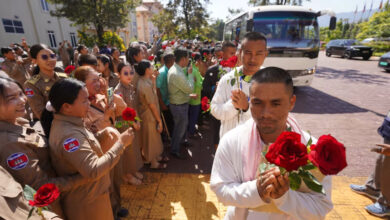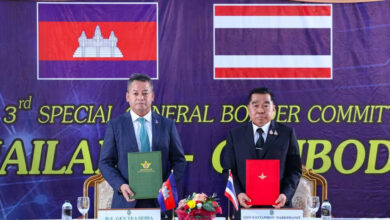
The only son of fugitive former Thai prime minister Thaksin Shinawatra has been formally charged with money-laundering, the Department of Special Investigations told Reuters on Wednesday.
Panthongtae Shinawatra is accused of receiving a 10 million baht ($300,000) check in 2004 related to an earlier corruption case involving 9.9 billion baht ($296 million) of fraudulent loans extended by the state-owned Krungthai Bank when his father was prime minister.
The deputy spokesman of the Department of Special Investigation (DSI), Woranan Srilum, said Panthongtae had turned himself in on Tuesday but had been released as no arrest warrant for him has been issued.
Panthongtae could now gather evidence for his case, Woranan said, while the DSI must decide whether to take the case to the criminal court.
Panthongtae was not available for comment. He complained this month of victimization and called for the dropping of the money-laundering investigation.
His lawyer declined to comment when contacted by Reuters.
Supporters of the Shinawatras say the legal action is the latest bid by authorities in junta-ruled Thailand to squeeze the Shinawatra family out of politics and blunt its influence.
Beginning in the late 1980s, former policeman Thaksin built a telecommunications conglomerate that made him one of Thailand’s richest and most powerful men.
After entering politics, he won landslide election victories, beginning in 2001, with the support of the rural and urban poor who saw him as the first political leader to care for them.
But he made powerful enemies, especially in the Bangkok-based establishment, which saw him and his populist ways as a threat.
Ousted in a 2006 coup, and later convicted of corruption, which he denies, Thaksin has overseen from self-exile victory for his party in every election since, most recently in 2011, when his sister, Yingluck Shinawatra, became prime minister.
She was ousted in a 2014 coup.
Last month, the Supreme Court sentenced Yingluck to five years in jail in absentia for mismanaging a rice subsidy scheme.
Recently, old cases against Thaksin have been revived, including an accusation that he abused power while he was prime minister by ordering the Export-Import Bank of Thailand to give low interest loans to Myanmar in 2006 to further his business interests.
In another case, Thaksin was accused of graft and negligence in connection with the approval of a lottery scheme in 2003.
Authorities are also looking to charge him with royal insult and computer crime for an interview he gave to South Korean media in 2015.
Thaksin, in a message he posted on Twitter this month, denied any thought of ever offending the “royal institution”.
Watcharapol Prasanrajkit, chairman of the National Anti-Corruption Commission, denied any bid to target the Shinawatras saying the cases just happened to be coming up at this time.
How Thaksin’s political machine performs in an election expected in November 2018 will be keenly watched.




